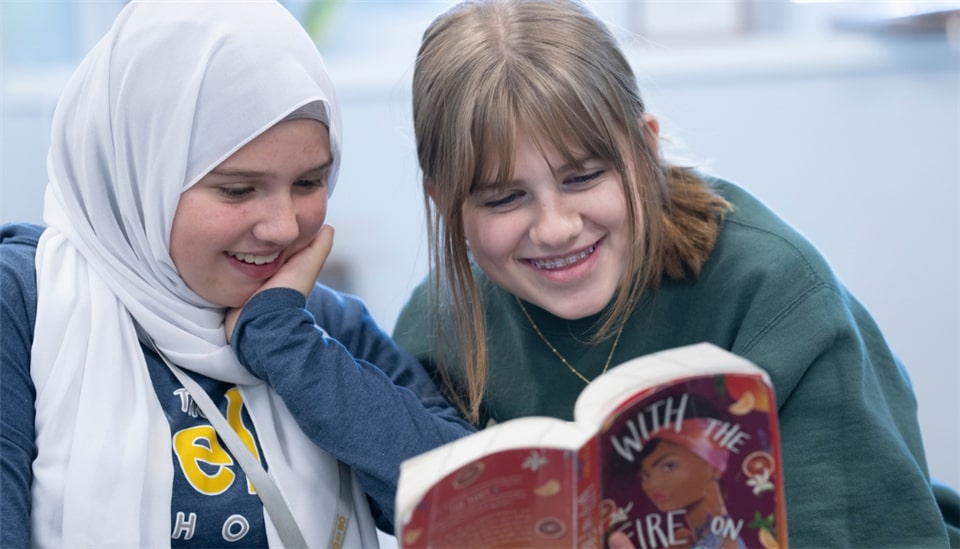
By Kevin Ford, English Department Chair, English Teacher
What makes summer reading an engaging and positive experience for students and also meets teacher learning goals? English Department Chair and English Teacher Kevin Ford examines this question by sharing his personal journey of discovery from student to teacher. There is also a great list of suggested summer reading provided by our Field faculty.
“Make it a rule never to give a child a book you would not read yourself” - George Bernard Shaw
Of all the great summer traditions - freedom from schoolwork, vacations with family, time at the pool, blockbuster movies - there is one which students have, for generations, particularly reviled: English Summer Reading.
Even for me, a student who was always reading - required or not! - summer reading seemed hit-or-miss, especially as texts grew denser and more challenging in high school. Summer reading eventually felt burdensome: less like a pleasant hike and more like painfully summiting a mountain.
To be sure, the highs were high: my Physics teacher primed us for the year’s learning by assigning Ender’s Game by Orson Scott Card, a sci-fi campus novel/space war story. I was surprised to discover that Science summer reading was fun! And, it turns out, in key scenes when students practice war strategy in zero gravity (essentially playing advanced laser tag), I was accidentally learning about vectors, momentum, gravity, and other Physics principles.
Beyond content, I learned through the summer reading that my teacher cared about my experience and would find dynamic ways to help me master concepts. Physics was my most challenging course that year, but I remain proud of the learning I achieved.
The lows were low. Going into Senior English, I was assigned Great Expectations by Charles Dickens, Siddhartha by Herman Hesse, and To the Lighthouse by Virginia Woolf. As with climbing a mountain, I was proud to say I’d actually read these books, but the exercise was excruciating. By September, I confirmed that Edward Albee was onto something: I was afraid of Virginia Woolf.
In ironic contrast with my Physics experience, English - my passion class; my easy class; my intellectual home - was dry, burdensome, and humorless that year, a culture that began forming with the summer reading. Before the class had even met, the summer reading had communicated a truism of our teacher’s instructional style: we were largely on our own.
It has been said that teachers are the symbols of their subject. I also think that assignments can be the symbols of the teacher, especially when summer reading is their introduction. I will forever connect Physics with Ender’s Game and my passionate, supportive teacher. For English, I’m so grateful this one bad year was preempted by teachers and novels that inspired me to love literature; otherwise, left to this one symbol of the subject, there’s no way I’d be an English teacher today.
In contrasting these summer reading experiences and thinking about other highs and lows of my student summers, I find myself adapting a famous quote from Tolstoy’s Anna Karenina: All good summer reading assignments are alike; each bad summer reading assignment is bad in its own way.
What, then, defines good summer reading?
After some consideration, I think summer reading should be designed to meet three objectives:
Let's put this to the test:
I would argue that my Physics reading met all three objectives: I found myself thinking about science at a time when, left to my own passions, I never would. I was actively primed for specific course concepts: throughout the year, my teacher could refer back to scenes from the summer reading. Finally, I found a science fiction book that I actually enjoyed.
My English example yielded more complex results: Summer loss was combatted, but in a way that burned us out before setting foot in the classroom. Put another way, our engines weren’t kept warm - they were needlessly thrown into overdrive. We learned content in the sense that we read books, but we would have learned more meaningfully if they had been paired with a teacher’s instruction. And sadly the experience turned me off to all three novels.
Thankfully a charismatic college professor resuscitated Great Expectations for me. Surprise - it’s a masterpiece!
Later, my professional experience required that I teach Siddhartha. I forced myself to encounter the text with new eyes and learned to love the book. I was able to teach it with passion and joy, making sure my students didn’t struggle through it alone. Far from being turned off to the novel, many students cited it each year as their favorite book.
Sadly, to this day, I’m still afraid of Virginia Woolf, which makes me all the more sensitive to the enduring impact of teachers’ choices on students' lives.
With all of this in mind, the English Department has been carefully developing summer reading assignments, which will be finalized and disseminated before the end of the school year. These assignments will be course-specific, hoping to meet the three criteria of “good summer reading”.
Beyond that, every faculty member was invited to share a summer reading book with the community. This list has recommendations from every department. After all, it’s not just English teachers who love reading! We hope this effort inspires you to read broadly, encounter new ideas, and grow in your reading life. And if nothing else, you know we’re recommending books we’ll definitely read ourselves.
Done correctly, summer reading can be a tradition we all look forward to.
Summer Reading Assignments
Summer reading assignments have been thoughtfully chosen by Field teachers. All rising 6-12th grade students have summer reading assignments in both English and History. Summer reading should be completed before the first day of school in August. Check the links below:
